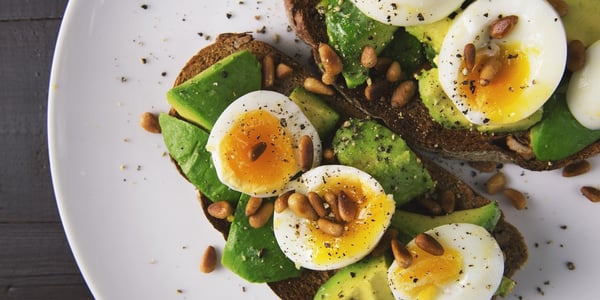Aging is an inevitable part of life, but our lifestyle choices, particularly our diet, can...


Aging is an inevitable part of life, but our lifestyle choices, particularly our diet, can...

Eating out is commonly one of the most enjoyable parts of our day. It can be a nice break from our...

In today's fast-paced world, we often find ourselves feeling tired and drained by mid-day,...

Entering your 50s often brings a sense of stability and a deeper appreciation for the finer things...
12 Simple Tips to Reduce Snacking
For many, snacking has gone from just an occasional indulgence to a frequent habit that’s intertwined into their daily routines. Snacking can easily disrupt your nutritional goals and contribute to an unhealthy lifestyle. These poor snacking habits are often caused by stress, boredom, or genuine hunger. It’s important to adopt strategies that help you minimize and make smarter choices about snacking to combat unwanted weight gain and unhealthy eating habits. In this blog, we’ll suggest several actionable tips to help reduce snacking effectively.
12 Tips to Reduce Snacking
Reducing snacking can be crucial to maintaining a healthy diet and controlling your calorie intake. Here are some practical tips to help you cut down on snacking:
1. Identifying Your Snacking Triggers
The first step to managing your snacking habits is identifying your triggers. Often, we reach for snacks, not out of hunger but due to emotions like boredom, stress, or even habit. Pay close attention to the times and situations in which you find yourself snacking. Is it during a particular time of the day? Are there emotional triggers that seem to prompt snacking? Keeping a food diary can be immensely helpful in seeing patterns and identifying triggers. Once you know what prompts your snacking, you can start to address these habits by finding healthier responses to stress or boredom.
2. Incorporate More Protein and Fiber into Meals
Integrating more protein and fiber into your meals can provide more energy and significantly reduce hunger spells that lead to snacking. Both nutrients have excellent satiety properties, meaning they keep you full longer. Start your day with a protein-rich breakfast like eggs or Greek yogurt, and include a fiber source such as whole grains or berries. For lunch and dinner, focus on lean proteins and include lots of vegetables, which are high in fiber and low in calories. This combination helps slow digestion, keeping blood sugar levels stable and preventing the mid-afternoon dip that often results in reaching for snacks.
3. Keep Healthy Snacks Handy
If snacking is a part of your day you're not ready to give up, opt for healthier choices. Prepare and store various nutritious snacks that are easily accessible wherever you might be—at home, work, or on the go. Good options include Greek yogurt with berries, raw vegetables like carrots or cherry tomatoes with hummus, or a handful of almonds. Packing these healthier snacks in your bag or keeping them within reach at your desk helps you avoid the temptation of less healthy, impulse-driven choices. Planning ahead and choosing wisely can satisfy your hunger pangs without compromising your health goals.
4. Stay Hydrated
Staying hydrated is a simple yet effective strategy to curb snacking. Often, we confuse thirst with hunger, leading to unnecessary snacking. Make a habit of drinking water regularly throughout the day; aim for about 8-10 glasses. Always keep a water bottle with you as a visual reminder to drink. If water is too bland, enhance its flavor with slices of fruit such as lemon, lime, or cucumber, or add a splash of 100% fruit juice for a hint of sweetness. Drinking water before reaching for a snack can help you determine if you are truly hungry or just thirsty, potentially reducing your caloric intake.
5. Manage Your Stress
Stress can often lead us to snack impulsively, so it's crucial to find effective ways to manage it. Engaging in stress-relieving activities can dramatically reduce the urge to turn to food for comfort. Consider incorporating practices like yoga, meditation, or deep-breathing exercises into your daily routine. Regular physical activities, such as walking, running, or swimming, also help alleviate stress and distract you from snacking. Additionally, hobbies that occupy your mind, such as painting, writing, or playing music, can provide therapeutic benefits and reduce the likelihood of stress eating. Finding what uniquely calms you can be a key tool in your strategy to cut down on snacking.
6. Distract Yourself
When the urge to snack hits, it's often more about boredom or habit than hunger. Finding a way to distract yourself can be an effective tactic to prevent unnecessary snacking. Engage in activities that require your full attention and are rewarding, such as solving a puzzle, engaging in a craft, or taking a brisk walk. Establishing a rule to snack only at designated eating places, like the dining table, can also discourage casual, mindless eating. These strategies help break the cycle of reaching for snacks whenever you feel bored or idle, supporting your overall goal of healthier eating habits.
7. Avoid Buying Unhealthy Snacks
One of the simplest ways to reduce snacking on unhealthy foods is not to keep them in your house. If chips, cookies, or candy aren't readily accessible, you're less likely to eat them. Instead, stock your pantry with healthier alternatives that align with your nutritional goals. Snacks such as dried fruits, nuts, seeds, whole-grain crackers, and air-popped popcorn can satisfy your cravings without the negative health impacts of high-sugar, high-fat options. Making these choices available can drastically reduce the temptation to indulge in less healthy snacks, steering you towards better eating habits.
8. Manage Your Portions
When it comes to snacking, the size of your dishes can significantly influence how much you consume. Opting for smaller plates and bowls can help control portion sizes and reduce overeating. This visual trick makes it appear as though you have more food, which can lead to feeling more satisfied with a smaller portion. Always serve yourself snacks on these smaller dishes instead of eating directly from the package, which can make it difficult to gauge how much you’re consuming. This simple change in your snacking habits can help maintain portion control and contribute to overall healthier eating patterns.
9. Set Scheduled Snack Times
Creating a structured schedule for snacking can help manage your eating habits and prevent overindulgence. Designate specific snack times during the day, ideally mid-morning and mid-afternoon, to keep energy levels stable and hunger at bay. This routine minimizes the chances of impulsive eating and helps your body establish a consistent metabolic rhythm. Choose balanced snacks that include a mix of protein, healthy fats, and fiber to sustain satiety until your next meal. Having a snack schedule also makes it easier to plan and prepare healthier snack options ahead of time, further supporting your nutrition goals.
10. Practice Mindful Eating
Mindful eating is about fully engaging with the eating experience, focusing on the flavors, textures, and smells of your food, and listening to your body's hunger and fullness cues. Eating slowly and without distractions like television or smartphones allows your body to register satiety, which can prevent overeating. Start by taking small bites and chewing thoroughly, appreciating each mouthful. This practice helps to reduce mindless snacking and encourages a healthier relationship with food. Implementing mindful eating during snack times can make them more satisfying and reduce the likelihood of reaching for additional food.
11. Get Enough Sleep
Adequate sleep is crucial for overall health and can significantly impact your eating habits. Lack of sleep disrupts the hormonal balance that regulates appetite, often leading to increased hunger and cravings for high-calorie, unhealthy foods. Aim to get 7-9 hours of quality sleep each night to help maintain proper hormone levels and support your body's natural hunger cues. Establishing a consistent bedtime routine, minimizing exposure to blue light from screens before bed, and creating a comfortable sleep environment can enhance sleep quality. By prioritizing sleep, you can better control your impulses to snack and maintain a healthier diet.
12. Eat Balanced Meals
If you frequently find yourself snacking, it might be time to reassess your main meals. Ensure your breakfast, lunch, and dinner are well-balanced, containing sufficient protein, fiber, and healthy fats to keep you satisfied and full for longer. If meals lack these essential nutrients, you might feel the urge to snack more often. Consider adding more whole grains, lean proteins, and vegetables to your dishes. Also, assessing portion sizes can help; sometimes, slight increases can prevent mid-meal hunger pains. By optimizing the nutritional content and portion sizes of your meals, you can reduce the need to snack excessively between meals.
Reducing snacking can be challenging, especially if it’s driven by habit or emotional needs. Implementing these tips can help you begin to take control of your snacking habits, making way for a healthier lifestyle and better nutritional choices. Remember, the goal isn’t necessarily to eliminate snacking entirely but to create a balanced approach that fits within your health goals and lifestyle.
Click here or the button below to find a Medicare Insurance plan with TopLine Financial Credit that fits your needs.
Living50+